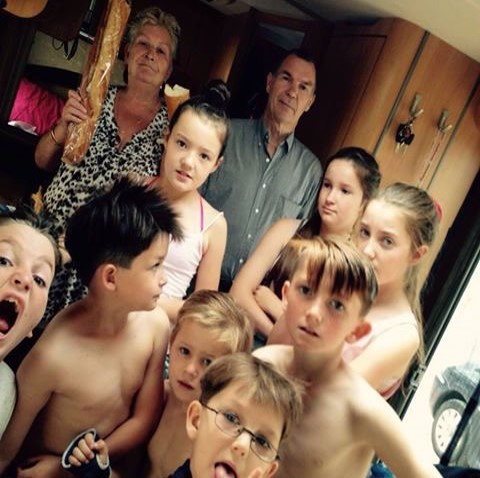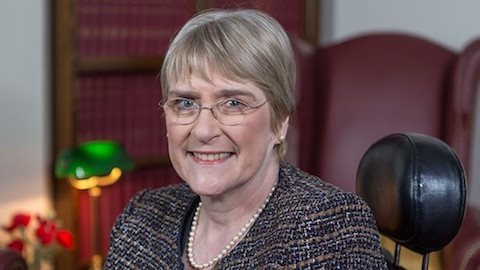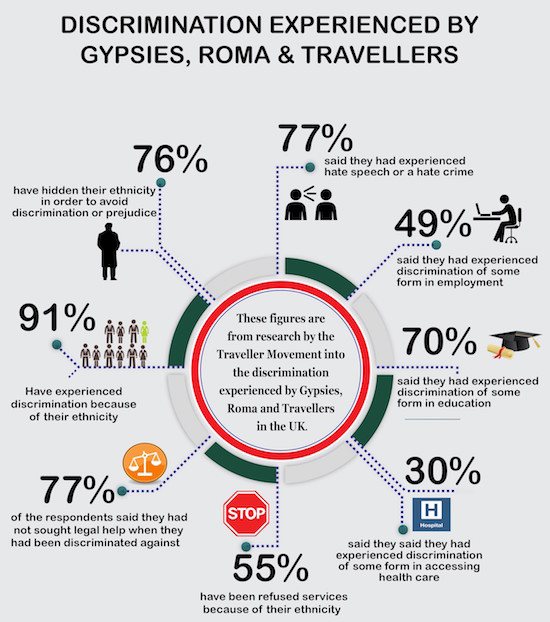New research shows shocking extent of the ‘last acceptable form of racism’
New research published and presented in the House of Lords today by the Traveller Movement shows that a shocking four out of five Gypsy, Roma and Traveller people have experienced a hate crime or hate speech.
The Traveller Movement’s research, ‘The last acceptable form of racism?’, sheds new light into Gypsy, Roma and Traveller people’s experience of prejudice and discrimination in areas such as education, employment, healthcare and access to services. It also reveals the full extent to which hate crime impacts on community members everyday lives, the coping mechanisms they use, and how likely they are to seek help.
Based on surveys of 214 Gypsy, Roma and Traveller people, the TM found that “the experience of racism and discrimination was so common for these communities that it has become almost normalised and many accept it as a fact of everyday life.”
Reacting to the research, Irish Traveller Patrick O’Leary, who won the case 17 years ago that established Irish Traveller ethnicity in UK law, said that the racism “had gone on for far too long”.

(Picture caption: Patrick O’Leary with his wife and grandchildren)
“When I won my case 17 years ago, I stood on the steps outside the court and said ‘for the first time in our lives we feel we can proudly and publicly tell everyone we are Irish Travellers’ but this research shows my people continue to suffer racism every single day and still have to hide who they are to try and stop it happening,” said Patrick O’Leary.
“And what breaks my heart most of all is that too many of us see it as a fact of life and think there’s nothing we can do about it,” he added.
“But if we are going to be free from the racism we suffer we have to show, using the courts, that we will no longer stand for it.”
“I hope this work by the Traveller Movement inspires more Gypsies, more Travellers and more Roma to come forward and challenge the racism that has gone on too long”.
The Liberal Democrat Peer and Traveller Movement Patron, Baroness Brinton, wrote a foreword for the research report and said that; “If action is not taken, Gypsies, Roma and Travellers will continue to face discrimination and will sadly see it as a fact of their daily lives”.

(Picture Caption: Baroness Brinton)
“The pervasive discriminatory behaviour directed toward Gypsy, Roma and Traveller people is borne out of ignorance and is usually based on ill-informed cultural stereotypes,” said Baroness Brinton.
“This lack of understanding or cultural awareness causes significant damage to the trust GRT people have in British society”.
The Lib Dem Peer added: “This is precisely why education is so important. Prejudice and hate is not a characteristic we are both with: it is a learned behaviour… “It is high time that Gypsy, Roma and Traveller History Month was supported by the Department for Education and rolled out in schools across the country.”
The Traveller Movement research shows that:
4 out of 5 (77%) of Gypsies, Roma and Travellers surveyed have experienced hate speech or a hate crime. This ranged from regularly being subject to racist abuse in public to physical assaults.
Despite the experience of prejudice being so common for Gypsies, Roma and Traveller (GRT) only 1 out of 5 (13%) has ever sought help. GRT people said they felt the police or legal professionals would not help them so saw seeking help “pointless”.
Half of Gypsy, Roma and Traveller people have experienced discrimination in the workplace. This ranged from being fired once the company learned of their heritage to colleagues refusing to work with them because of their ethnicity.
The dominant coping mechanism Gypsies, Roma and Travellers used when trying to avoid racism was to try and hide their ethnicity (77% said they regularly attempted to hide their ethnicity).
70% of Gypsies, Roma and Travellers said they had experienced prejudice in education, with teachers being mentioned most frequently in the context of perpetuating stereotypes and overlooking bullying and racism.
Key findings and testimonies from the Gypsies, Roma and Travellers
Education: 70% said they had experienced discrimination in education, with teachers being most frequently mentioned either by perpetuating stereotypes or overlooking bullying.
Testimonies on discrimination in education:
“Even the teachers would call our family the ‘Gypsy family’. Like we were a disease.”
[A teachers comment to a child]: “There is no point teaching you, you will only end up tarmacking drives”
“As a PhD student, I have been treated as an oddity or as incompetent by my peers and professors”.
Employment: 49% of GRT people had experienced discrimination in employment including in applying for a job, career progression and being fired once their ethnicity became known.
Testimonies on discrimination in employment:
“I went for a cleaning job; when I told her where I lived she, as the pub owner, said ‘we don’t serve your sort and I would not employ you’”
“I have worked for a company and I was asked not to come back because the other men refused to work with a Gypsy”
Hate crime and hate speech: 4 out of 5 (77%) of Gypsies, Roma and Travellers surveyed had experienced hate speech or a hate crime including regular public verbal abuse, physical assault and racism on social media.
Testimonies on experiencing hate crime and hate speech:
“Random people would just shout ‘Dirty fucking pi***s’. ‘Get out of my country’, ‘I will burn your caravan down when you sleep!’ and at one point a woman screamed at my 9-year-old sister ‘Dirty thieves who should have been deported. Even the young one’ (even though we was born in England)”
“Was physically assaulted by a man who said he was tired of ‘pi***s’ taking over ‘his country’”
“I’ve been called a ‘pi**y’ regularly. I’ve had my vehicle vandalised with graffiti. I’ve been threatened that they are going to come back and set my van on fire.”
Seeking help: 77% said they had not sought any legal help after experiencing discrimination with most explaining that they saw “no point” as they would not be taken seriously because they were a Gypsy, Roma or Traveller.
Testimonies on not seeking help:
“It will never stop so why bother. Grown a thick layer of skin”.
“Pointless as they would just look at my case and throw it out because I’m a Traveller”
Policing: Over 50 of the Gypsy, Roma and Traveller people who took part specifically mentioned mistreatment by the police.
Testimonies on discrimination by the police:
“The police refuse to turn up when vigilantes are trying to burn you out”
“The police don’t take racism against Gypsies as valid”
Accessing services: 55% said they had been denied access to services because of their ethnicity, with pubs and restaurants being the most common scenario.
Testimonies on being denied entry to pubs/restaurants:
“Refused service in a pub because we were ‘dirty traveller scum’”
“On an almost weekly basis, clubs/pubs/eateries/shops, the local cinema, at this point it would be easier to list local places that serve Travellers than ones that don’t”
Healthcare: 30% had experienced discrimination when accessing health care. This was most frequently mentioned in being turned away from GPs and being mistreated by receptionists.
Testimonies on discrimination in healthcare:
[GPs repeatedly] “refused help for my child’s hernia because [we] were of no fixed abode”
“Been refused antenatal care”
The release of the research coincides with a campaign called #DontTeachHate, funded by the Department for Communities and Local Government, to raise awareness of hate crime and discrimination against Gypsies, Roma and Travellers.